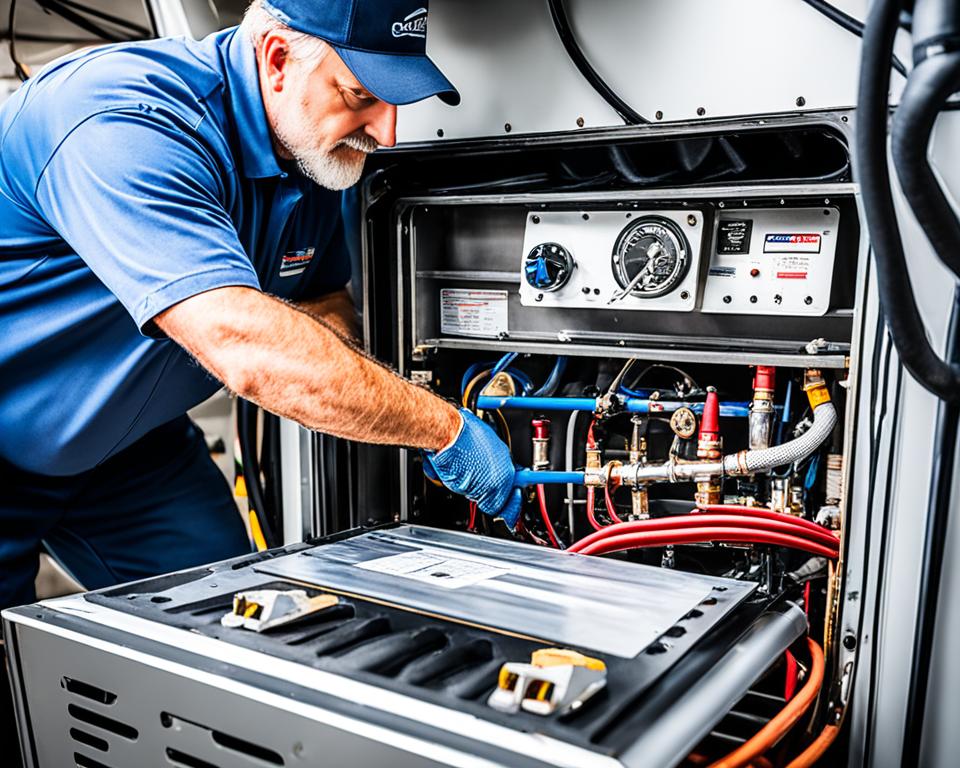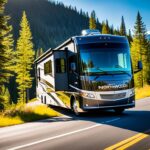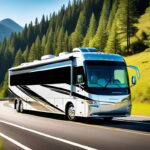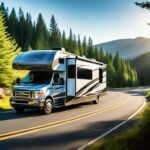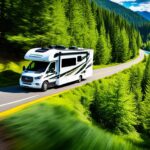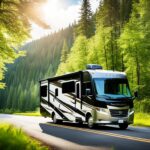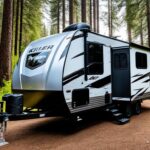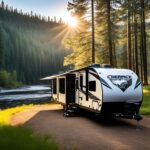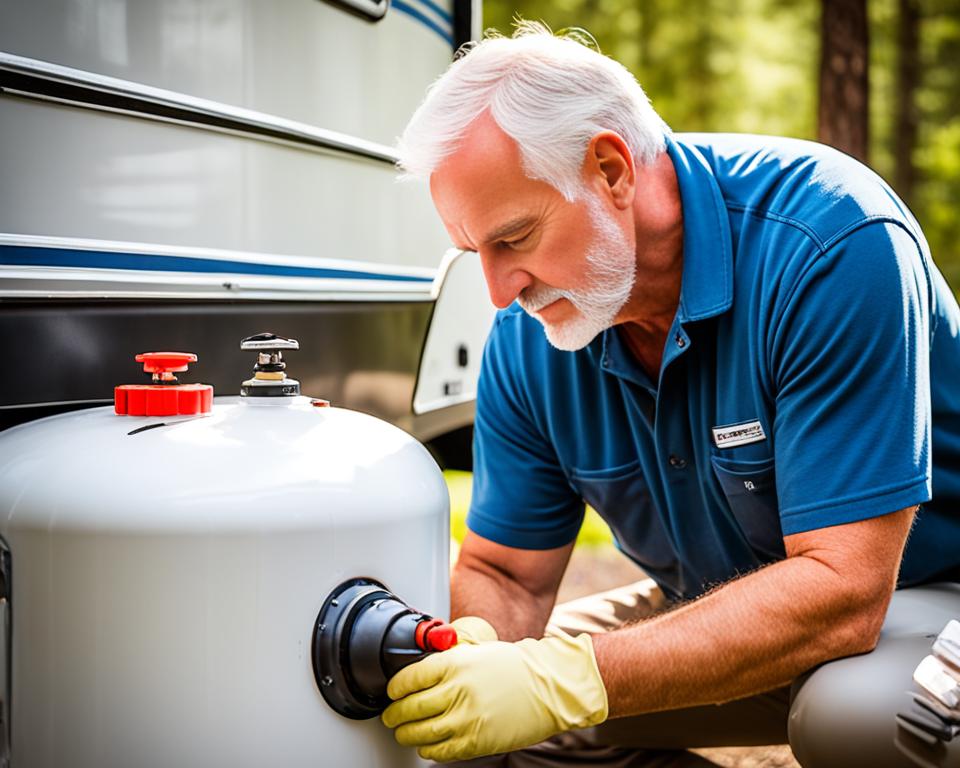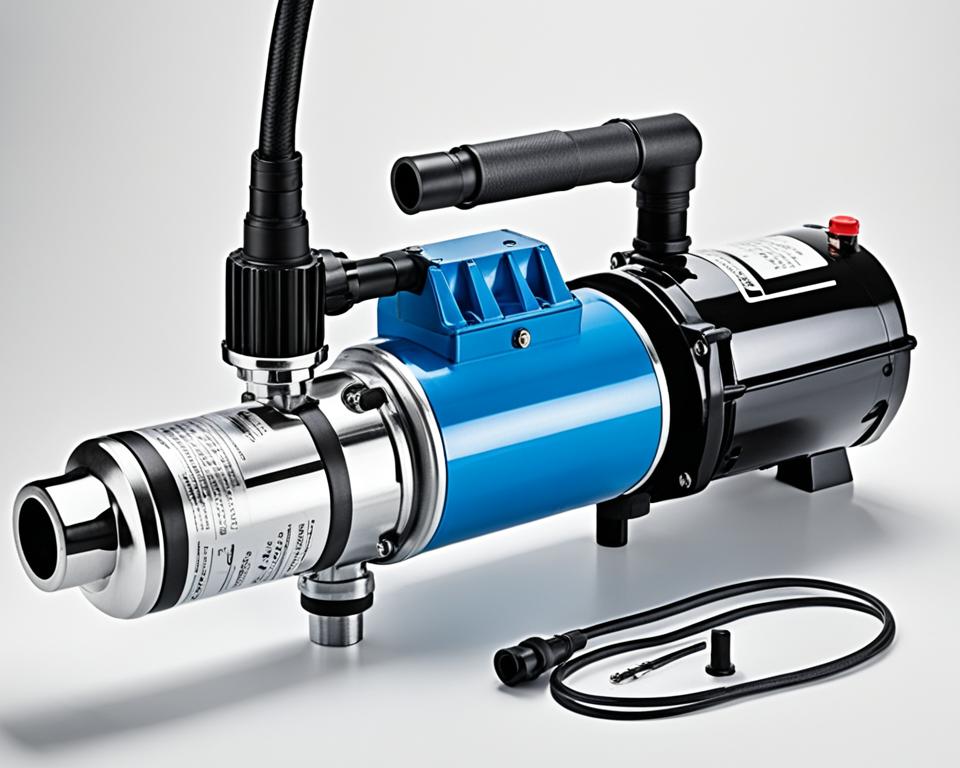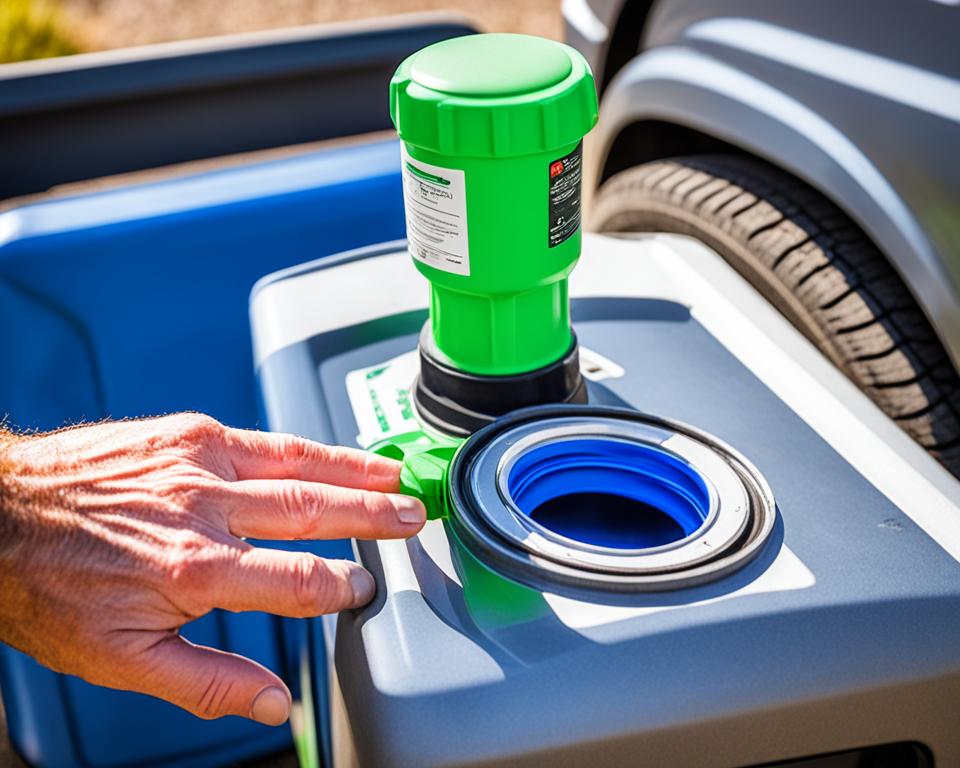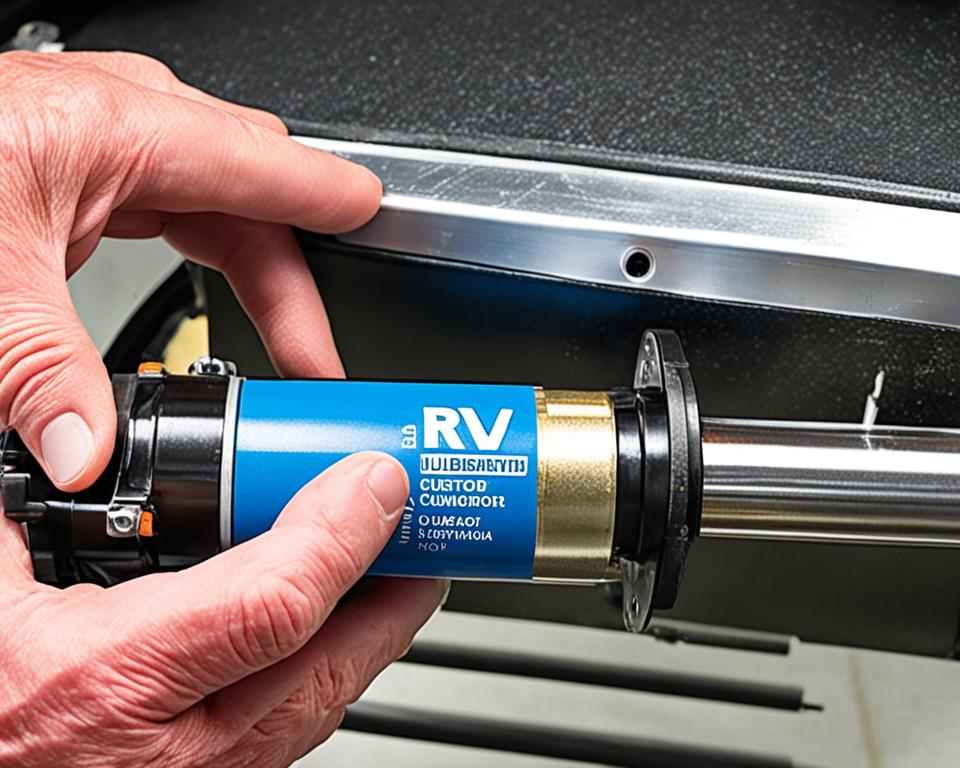Regular maintenance is essential for the longevity and performance of RV appliances. Neglecting maintenance can lead to costly repairs and decrease the resale value of your RV. So, whether you’re a seasoned RV enthusiast or new to the world of RVing, it’s important to prioritize the care of your appliances.
In this article, we will provide you with valuable tips and tricks for seasonal RV appliance maintenance. From pre-trip checklists to monthly, seasonal, and yearly maintenance tasks, we’ve got you covered. We’ll also discuss the importance of regular inspections, DIY vs. professional maintenance, essential RV amenities, and how to find reliable RV maintenance services.
To ensure your RV appliances stay in top shape, follow our comprehensive RV appliance maintenance checklist and incorporate these essential RV maintenance tips into your routine. By taking the time to properly maintain your appliances, you can enjoy worry-free travels in your RV.
Key Takeaways:
- Regular maintenance is crucial for the longevity and performance of RV appliances.
- Neglecting maintenance can lead to costly repairs and decrease the resale value of your RV.
- Follow our comprehensive RV appliance maintenance checklist for optimal performance.
- Perform pre-trip, monthly, seasonal, and yearly maintenance tasks to keep your appliances in top shape.
- Regular inspections are essential for identifying potential issues before they become major problems.
Importance of RV Maintenance
The proper maintenance of RV appliances is crucial for their longevity and optimal performance. Neglecting regular maintenance can lead to costly repairs and decrease the resale value of your RV. Implementing best practices for RV appliance maintenance, ensuring proper care, and following essential maintenance guidelines are all essential for the smooth functioning of your RV appliances.
About 70% of RV failures are a result of insufficient maintenance. Regular inspections and upkeep of your appliances are necessary to keep them in excellent working condition. Engaging in proper maintenance not only ensures that your appliances function optimally but also increases the resale value of your RV. It’s a win-win situation that benefits both your RV’s performance and your wallet.
Proper RV appliance maintenance encompasses several tasks. Regular cleaning is essential to prevent dust and debris buildup that can impede the appliances’ performance. Lubrication of moving parts ensures smooth functioning and prolongs the life of the components. Checking seals for any signs of deterioration helps maintain energy efficiency and prevents water leaks. Regular testing of safety equipment such as smoke detectors and carbon monoxide detectors ensures the safety of you and your loved ones while on your RV adventures.
Taking the time to perform essential RV appliance maintenance not only guarantees that your appliances will continue to operate smoothly but will also contribute to a hassle-free and enjoyable RV experience. By following best practices, providing proper care, and conducting regular maintenance, you can ensure that your RV appliances will serve you well on all your adventures.
Pre-Trip RV Maintenance
Before embarking on your next RV adventure, it’s crucial to perform a thorough maintenance check. Taking the time to inspect and prepare your RV will ensure a safe and enjoyable trip. Follow these RV maintenance steps before a trip to make sure everything is in working order:
1. Read the Manuals
Start by familiarizing yourself with the manuals for your RV and its appliances. These provide valuable information on maintenance requirements, troubleshooting, and safety precautions. Refer to the manuals to ensure you understand how to properly care for and operate your equipment.
2. Check Tires and Wheels
Inspect the condition of your RV’s tires, including the tread depth and tire pressure. Ensure they are properly inflated for safe and efficient travel. Additionally, examine the wheels for any signs of damage or loose lug nuts. It’s also a good idea to have a spare tire on hand in case of emergencies.
3. Inspect the Electrical Connection
Check all electrical connections, including the RV’s power cord and trailer brakes. Look for any frayed wires, loose connections, or signs of wear and tear. Ensuring a secure and reliable electrical connection is essential for the proper functioning of your RV’s appliances and systems.
4. Test All Systems
Before hitting the road, test all of the RV’s systems to ensure they are in working order. This includes the plumbing, electrical, propane, heating, and cooling systems. Run the water faucets, flush the toilets, and check for leaks or malfunctioning components. Test the propane system and check that all appliances are operating correctly. Lastly, verify that the heating and cooling systems are providing the desired temperature and air circulation.
Performing these pre-trip RV maintenance steps will help identify any potential issues and prevent unexpected breakdowns while on the road. Remember, safety should always be a priority. Now that you’ve completed the pre-trip maintenance, you can confidently embark on your RV adventure! Just imagine the excitement and freedom that awaits!
Monthly RV Maintenance
Performing monthly maintenance tasks is crucial for keeping your RV appliances in proper working order. Regular checks and routine maintenance help prevent potential issues and ensure that your appliances function optimally. Follow this monthly RV maintenance checklist to keep your RV in top shape:
- Check Seals: Inspect all seals, including those on windows, doors, and slide-outs, for any signs of wear or damage. Replace or repair seals as necessary to prevent leaks and drafts.
- Clean and Lubricate Slide-Outs: Slide-outs provide additional living space in your RV, so it’s important to keep them clean and lubricated. Remove any dirt or debris and apply a lubricant recommended by the manufacturer to ensure smooth operation.
- Inspect Batteries: Check the battery voltage and electrolyte levels regularly. Clean the terminals and ensure they are securely connected. Replace batteries that are no longer holding a charge.
- Check Hoses and Fluid Levels: Inspect all hoses for cracks, leaks, or bulges. Replace any damaged hoses immediately. Additionally, check the fluid levels in your engine, generator, and other systems. Top up or change fluids as needed.
- Run and Service the Generator: Regularly run your RV’s generator for a minimum of 30 minutes to ensure proper functioning. Follow the manufacturer’s instructions for service, including oil and filter changes, as well as spark plug replacements.
- Clean the A/C Unit: Clear any debris or dust accumulations on your RV’s air conditioning unit. Use a soft brush or compressed air to clean the fins and remove any clogs that may reduce efficiency.
- Test Detectors: Test the carbon monoxide (CO) and smoke detectors in your RV. Replace batteries or the entire unit if necessary for reliable safety monitoring.
By performing these monthly maintenance tasks, you’ll ensure that your RV appliances continue to operate efficiently, providing you with a comfortable and enjoyable travel experience.
Seasonal RV Maintenance
Seasonal maintenance is a vital part of keeping your RV in top shape. Taking the time to perform these maintenance tasks will not only ensure the optimal performance of your RV appliances but also enhance the overall appearance of your vehicle. Here are some essential seasonal maintenance tips for both the exterior and interior of your RV.
Exterior Maintenance
To keep the exterior of your RV looking its best, make sure to:
- Wash and Wax: Regularly washing and waxing your RV’s exterior helps protect it from the elements and maintain its shine.
- Awning Fabric: Clean or replace the awning fabric as needed to prevent mold and mildew buildup.
- Oil Change: Get an oil change for your RV to keep the engine running smoothly.
- Roof and Seals: Perform maintenance on the roof, body seams, and seals to prevent leaks and water damage.
By following these maintenance tasks, you can ensure the longevity and appearance of your RV’s exterior.
Interior Maintenance
To maintain a clean and comfortable interior in your RV, consider the following tasks:
- Deep Cleaning: Thoroughly clean the interior of your RV, including carpets, upholstery, and surfaces.
- Appliances: Check and service all RV appliances to ensure they are functioning correctly.
- Air Conditioning Unit: Clean and maintain the A/C unit to keep it running efficiently.
By regularly performing interior maintenance tasks, you can create a pleasant living space in your RV and ensure the smooth operation of your appliances.
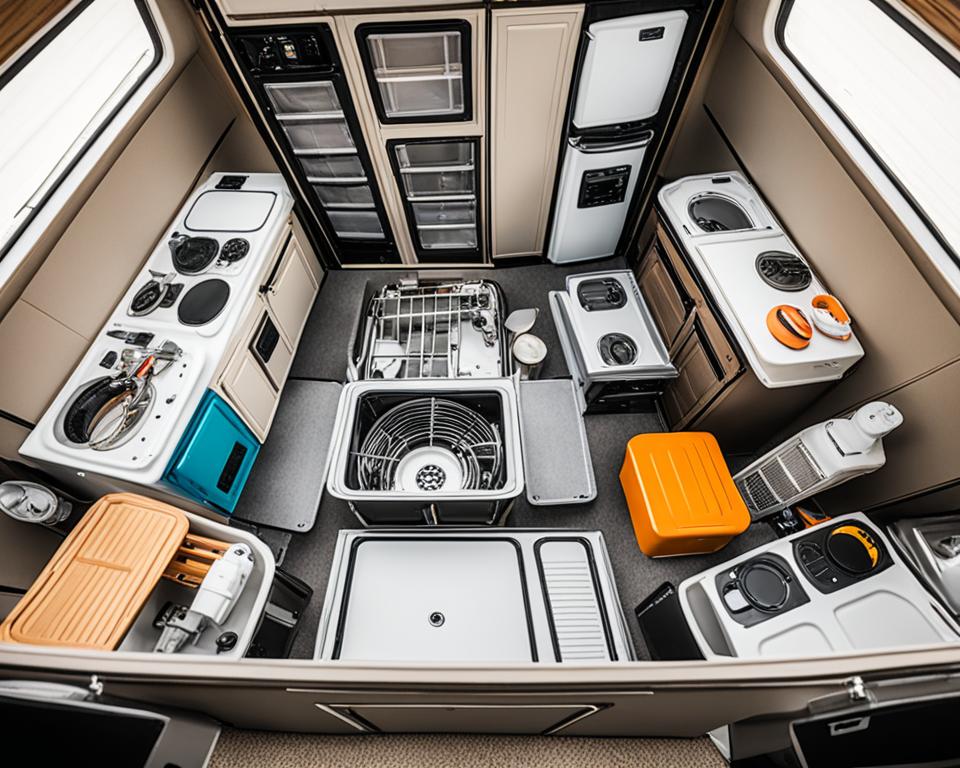
Seasonal Maintenance Checklist
| Exterior Maintenance | Interior Maintenance |
|---|---|
| Wash and wax the exterior | Deep clean the interior |
| Clean or replace awning fabric | Check and service RV appliances |
| Get an oil change | Clean and maintain A/C unit |
| Perform roof and seal maintenance |
Regular seasonal maintenance for both the exterior and interior of your RV is key to ensuring its optimal performance and appearance. By following these maintenance tips, you can enjoy worry-free travels and prolong the lifespan of your RV appliances.
Yearly RV Maintenance
Yearly maintenance is a crucial part of keeping your RV in excellent condition and ensuring a smooth and enjoyable travel experience. This comprehensive inspection and maintenance checklist covers key areas that need attention on an annual basis.
Tire Check and Replacement
Regularly inspecting your RV tires is important to ensure safety on the road. Check the tread depth and look for signs of wear and tear, such as cracks or bulges. If your tires are nearing their lifespan or show signs of damage, it’s time to replace them with new ones.
Repacking Bearings
The bearings in your RV’s wheel hubs should be repacked annually to prevent friction and ensure smooth wheel rotation. This maintenance task involves removing the hub assembly, cleaning and inspecting the bearings, repacking them with grease, and reassembling everything. Properly lubricated bearings reduce the risk of overheating and failure while traveling.
Gas Detector Inspection
Your RV’s gas detector is a critical safety device that alerts you to the presence of propane or other harmful gases. Test the detector regularly to ensure it is functioning correctly and replace the batteries as needed. If the gas detector is outdated or giving false alarms, it’s time to replace it with a newer model for reliable protection.
Switching to LED Lights
Upgrading your RV’s lighting system to LED lights has multiple benefits. LED lights are more energy-efficient, last longer, and produce less heat compared to traditional incandescent bulbs. Swap out all interior and exterior lights with LED equivalents to save energy, extend battery life, and reduce the need for frequent bulb replacements.
Maintaining Body Seams and Seals
Inspect the body seams and seals of your RV to ensure they are intact and free from cracks or gaps. Apply appropriate sealants as needed to prevent water leaks and protect against moisture damage. Properly maintaining body seams and seals helps preserve the structural integrity of your RV and prolong its lifespan.
| Yearly RV Maintenance Checklist |
|---|
| 1. Tire Check and Replacement |
| 2. Repacking Bearings |
| 3. Gas Detector Inspection |
| 4. Switching to LED Lights |
| 5. Maintaining Body Seams and Seals |
By following this yearly RV maintenance checklist, you can ensure that your RV is well-maintained and ready for your next adventure. Regular inspections and maintenance not only prevent potential issues but also extend the lifespan of your RV, saving you time and money in the long run.
Essential RV Amenities
In addition to appliances, there are other essential amenities in an RV that require regular maintenance. Neglecting these amenities can result in costly repairs and inconvenience during your travels. Follow this RV amenities checklist to ensure that these vital systems are in top shape and ready for your next adventure.
Water System
The water system in your RV is responsible for providing fresh water for drinking, cooking, and showering. Regular maintenance helps prevent leaks, keeps water flowing smoothly, and avoids contamination. Follow this RV water system maintenance checklist:
- Check for leaks in pipes and fittings
- Clean or replace water filters
- Flush the water tanks regularly
- Inspect and clean the water pump
Propane System
The propane system in an RV provides fuel for cooking, heating, and running appliances. Proper maintenance is essential to prevent gas leaks and ensure the safe operation of propane-powered devices. Use this RV propane system maintenance checklist:
- Inspect propane tanks for leaks and damage
- Check and replace propane hoses and fittings if needed
- Clean and test propane appliances regularly
- Verify that propane detectors are functioning properly
RV Batteries
The RV batteries power various systems in your vehicle, such as the lights, water pump, and appliances when you’re not connected to shore power. Regular maintenance prolongs battery life and prevents unexpected power outages. Consider these RV battery maintenance tips:
- Check battery voltage and fluid levels regularly
- Clean battery terminals and connections
- Test battery charging system
- Recharge or replace batteries as necessary
HVAC System
The HVAC system in your RV ensures a comfortable living environment regardless of the outside temperature. Proper maintenance helps maintain air quality, prevent breakdowns, and optimize energy efficiency. Follow this RV HVAC system maintenance checklist:
- Clean or replace air filters regularly
- Clean and inspect air ducts for debris
- Check and clean condenser and evaporator coils
- Lubricate motor bearings and fan blades if applicable
Awnings
Awnings provide shade and protection from the elements, allowing you to enjoy the outdoors in comfort. Regular maintenance ensures their proper functioning and prolongs their lifespan. Here are some awning maintenance tips:
- Inspect awning fabric for tears or damage
- Clean awning fabric regularly to remove dirt and debris
- Apply lubricant to moving parts
- Securely fasten awning arms and support legs
By regularly maintaining these essential RV amenities, you can enjoy worry-free travels and a comfortable living experience on the road. Refer to this RV amenities checklist to stay on top of maintenance tasks and prevent any unexpected issues during your adventures.
| Amenity | Maintenance Tasks |
|---|---|
| Water System | Check for leaks, clean or replace filters, flush tanks, inspect and clean water pump |
| Propane System | Inspect tanks for leaks, check and replace hoses and fittings, clean and test appliances, verify detector functioning |
| RV Batteries | Check voltage and fluid levels, clean terminals and connections, test charging system, recharge or replace batteries |
| HVAC System | Clean or replace air filters, clean air ducts, check and clean coils, lubricate motor bearings and fan blades |
| Awnings | Inspect fabric, clean regularly, apply lubricant, secure arms and support legs |
Regular maintenance of these essential RV amenities ensures a smooth and enjoyable journey. Take care of these systems and you’ll be able to fully appreciate the comforts of your RV while exploring new destinations.
Importance of Regular Inspections
Regular RV inspections are an essential part of maintaining the performance and safety of your vehicle. By conducting thorough inspections, you can identify potential issues before they become major problems, preventing costly repairs and ensuring the longevity of your RV and appliances.
Inspecting seals, systems, and components allows you to detect any signs of wear, damage, or malfunction. For example, inspecting the seals around windows, doors, and vents can help prevent water leaks and moisture damage. Checking the electrical and plumbing systems ensures that everything is functioning properly and reduces the risk of failures or accidents. Additionally, inspecting appliances such as the refrigerator, stove, and HVAC system can help catch any issues early on and make necessary repairs or replacements.
“Regular RV inspections can save you time, money, and stress. By catching problems early, you can avoid costly repairs and enjoy worry-free travels.”
Another benefit of regular inspections is that they enhance the overall safety of your RV. By ensuring that all systems and components are in good working order, you minimize the risk of accidents or emergencies while on the road. For example, inspecting the tires regularly can help identify signs of wear or damage, reducing the risk of blowouts or accidents caused by tire failure.
Performing regular inspections also adds value to your RV. When it comes time to sell or trade in your vehicle, potential buyers or dealers will appreciate the well-maintained condition. Regular inspections provide documented proof that your RV has been cared for, boosting its resale value and making it an attractive option in the market.
Benefits of Regular RV Inspections:
- Identify potential issues before they become major problems
- Prevent costly repairs and breakdowns
- Ensure the safety of your RV and appliances
- Enhance the performance and efficiency of your RV
- Boost the resale value of your RV
Whether you choose to perform inspections yourself or hire a professional, regular RV inspections are an investment in the longevity and enjoyment of your vehicle. By staying proactive and catching issues early, you can maximize the lifespan of your RV and have peace of mind while on your adventures.
| Benefits of Regular RV Inspections | Regular RV Inspections |
|---|---|
| Identify potential issues before they become major problems | ✔️ |
| Prevent costly repairs and breakdowns | ✔️ |
| Ensure the safety of your RV and appliances | ✔️ |
| Enhance the performance and efficiency of your RV | ✔️ |
| Boost the resale value of your RV | ✔️ |
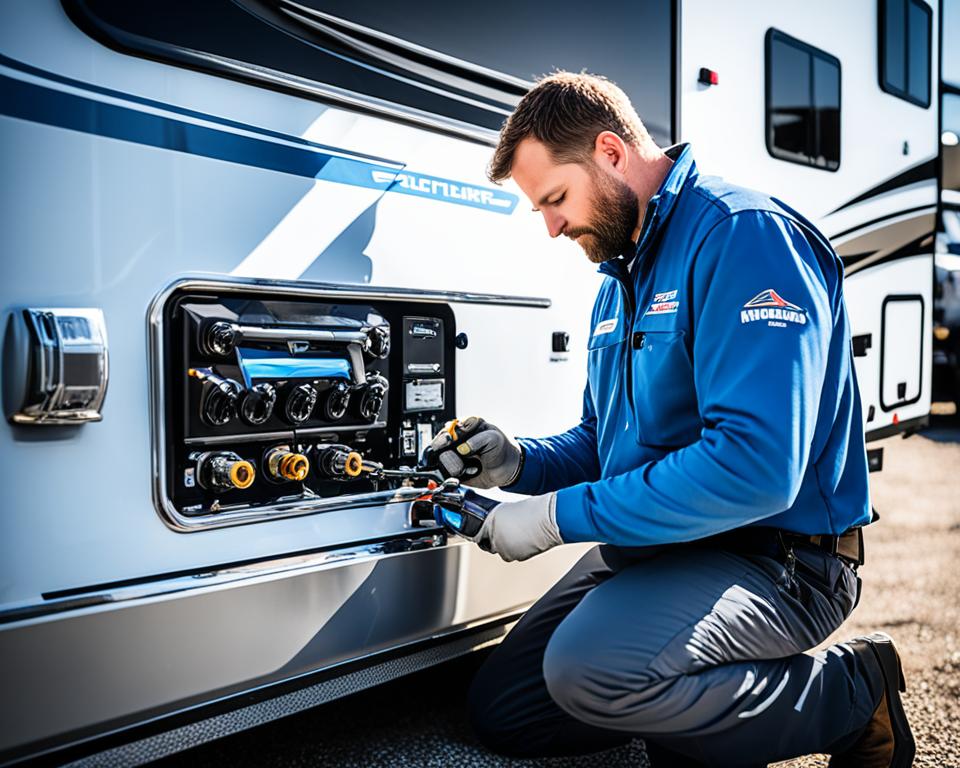
Regular RV inspections provide peace of mind and confidence in the performance and safety of your vehicle. Take the time to conduct thorough inspections and address any issues promptly to ensure worry-free travels and maximize the value of your investment.
DIY vs. Professional Maintenance
When it comes to RV maintenance, deciding between DIY (Do-It-Yourself) and professional assistance is an important consideration. While some maintenance tasks can be tackled by RV owners themselves, others may require the expertise of a professional. It’s essential to assess your skills, knowledge, and comfort level before making a decision.
DIY RV maintenance can be a rewarding experience for those who enjoy tackling projects and have the necessary skills. It allows you to have a hands-on approach, saving money on labor costs, and gaining a sense of accomplishment. Routine tasks such as cleaning, basic repairs, and inspections can often be performed by RV owners with the help of online resources, manuals, and instructional videos.
However, it’s crucial to consider the complexity and potential risks associated with certain maintenance tasks. Some critical systems, such as electrical or propane systems, require specialized knowledge and expertise to ensure safety and prevent damage. Attempting these tasks without proper understanding may result in costly repairs or compromise the integrity of your RV.
On the other hand, professional RV maintenance offers a convenient solution for those who prefer to leave the work to qualified technicians. Hiring professionals ensures that your RV receives expert care, with thorough inspections and precise maintenance techniques. They possess the skills, knowledge, and tools necessary to handle complex tasks effectively.
Professional RV maintenance can also provide peace of mind, knowing that your RV is in the hands of experienced individuals who understand the specific needs of your vehicle. They can identify potential issues early on and offer proactive solutions, potentially saving you from more significant problems down the road.
Ultimately, the decision between DIY and professional maintenance depends on various factors, including your comfort level, available time, budget, and the nature of the task at hand. For routine preventive maintenance tasks and minor repairs, DIY may be a feasible option. However, when it comes to intricate or safety-critical tasks, seeking professional assistance is highly recommended.
So, before you decide to embark on a DIY maintenance journey or reach out to a professional, carefully evaluate the complexity of the task and your personal capabilities. Remember, ensuring the proper maintenance of your RV is crucial for its longevity, performance, and your overall enjoyment.
| DIY Maintenance | Professional Maintenance |
|---|---|
| Cost-effective | Expert care and knowledge |
| Hands-on experience | Thorough inspections and preventive maintenance |
| Requires skills and knowledge | Specialized expertise and tools |
| Convenient time management | Time-saving option |
| Basic repairs and cleaning | Complex tasks and critical system maintenance |
Tips for Finding RV Maintenance Services
When it comes to professional RV maintenance, finding a reputable and reliable service provider is essential. You want to ensure that your RV is in the hands of qualified technicians who will provide top-notch service. Here are some tips to help you find the right RV maintenance services for your needs:
- Research local RV service providers: Start by researching local RV service providers in your area. Look for companies that specialize in RV maintenance and have a good reputation.
- Read reviews: Check online platforms and review websites to see what other RV owners have to say about the service providers you are considering. Pay attention to ratings, comments, and overall customer satisfaction.
- Ask for recommendations: Seek recommendations from fellow RV owners, friends, or family members who have had positive experiences with RV maintenance services. They can provide valuable insights and help you narrow down your options.
- Check for certifications and qualifications: Look for certifications or qualifications that indicate the service provider’s expertise and professionalism. For example, certifications from the Recreation Vehicle Industry Association (RVIA) or specific training for RV technicians.
- Inquire about warranty coverage: Ask the service providers about their warranty coverage for the services provided. A reputable RV maintenance service should offer some form of warranty or guarantee for their work.
- Consider pricing and services: Compare the pricing and services offered by different RV maintenance providers. While cost is an important factor, it should not be the sole determining factor. Look for a balance between affordability and quality of service.
By following these tips, you can find reliable RV maintenance services that will keep your RV in excellent condition. Remember to research, read reviews, ask for recommendations, and ensure that the service provider is qualified and reputable.
Conclusion
Regular maintenance is essential for keeping your RV appliances in top shape. By following a checklist and performing routine inspections, you can prevent costly repairs and ensure the longevity of your RV. Taking the time to properly maintain your appliances will lead to worry-free travels in your RV.
To keep your RV appliances in the best possible condition, it is important to follow some key tips for seasonal upkeep. First, make sure to clean and lubricate all moving parts regularly. This will help prevent friction and ensure smooth operation. Additionally, check and replace any worn-out or damaged parts to avoid further issues. Don’t forget to inspect and maintain the seals, as they play a critical role in keeping your appliances watertight and efficient.
Furthermore, conducting regular tests and inspections of safety equipment, such as detectors and extinguishers, is crucial for your peace of mind on the road. Finally, remember to refer to your RV’s owner manual for specific maintenance guidelines and recommended schedules. By following these tips for seasonal RV appliance upkeep, you can maintain the performance and reliability of your appliances and enjoy worry-free adventures in your RV.
FAQ
What are the benefits of seasonal RV appliance maintenance?
Seasonal maintenance helps ensure the overall performance and appearance of your RV appliances. It includes tasks such as washing and waxing the exterior, deep cleaning the interior, and inspecting and maintaining the body seams and seals.
What should I include in my pre-trip RV maintenance checklist?
Before each trip, it is important to perform a thorough maintenance check. This includes reading the manuals for your RV and appliances, checking tires and wheels, inspecting the electrical connection, and ensuring all systems are in working order.
What tasks should I include in my monthly RV maintenance routine?
Monthly maintenance tasks for RV appliances include checking seals, cleaning and lubricating slide-outs, inspecting batteries, checking hoses and fluid levels, running and servicing the generator, cleaning the A/C unit, and testing detectors.
What should be included in my seasonal RV maintenance routine?
Seasonal RV maintenance includes washing and waxing the exterior, deep cleaning the interior, cleaning or replacing awning fabric, getting an oil change, and performing maintenance on the RV roof, body seams, and seals.
What tasks should be part of my yearly RV maintenance routine?
Yearly maintenance focuses on comprehensive inspections and maintenance tasks. This includes checking and replacing tires, repacking bearings, checking gas detectors, switching to LED lights, and maintaining the body seams and seals.
Besides appliances, what other amenities in an RV require maintenance?
In addition to appliances, essential RV amenities that require maintenance include the water system, propane system, RV batteries, HVAC system, and awnings.
Why are regular inspections important for RV appliances?
Regular inspections are essential for identifying potential issues before they become major problems. Inspecting seals, systems, and components can prevent costly repairs and ensure the safety of your RV and appliances.
Should I do my RV maintenance myself or hire a professional?
Some maintenance tasks can be done by RV owners themselves, while others may require professional assistance. Assess your skills and knowledge before deciding whether to DIY or hire a professional for maintenance and repairs.
How do I find a reputable RV maintenance service provider?
When you need professional RV maintenance, it is important to find a reputable and reliable service provider. Research local RV service providers, read reviews, and ask for recommendations to ensure you choose a qualified technician.
Why is regular maintenance important for RV appliances?
Regular maintenance is essential for keeping your RV appliances in top shape. Following a checklist and performing routine inspections will help prevent costly repairs and ensure the longevity of your RV. Take the time to properly maintain your appliances, and you’ll enjoy worry-free travels in your RV.

